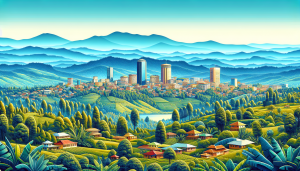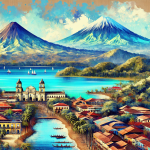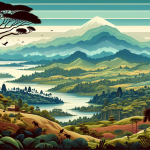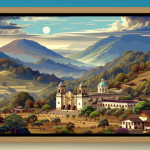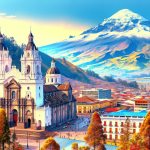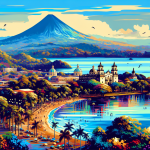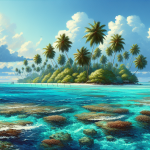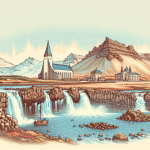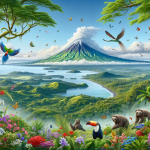Exploring Rwanda: The Land of a Thousand Hills
Rwanda, often referred to as the “Land of a Thousand Hills,” is a captivating destination that offers a rich tapestry of culture, history, and natural beauty. This small yet vibrant country in East Africa has emerged from a tumultuous past to become one of Africa’s most remarkable success stories. While Rwanda is widely known for its tragic history of the 1994 genocide, it has since transformed into a beacon of hope and resilience, making it a must-visit destination for travelers seeking an authentic and enriching experience. In this comprehensive guide, we will delve into the many facets of Rwanda, from its stunning landscapes and wildlife to its warm and welcoming people. Whether you’re an adventurer, a nature enthusiast, or a culture buff, Rwanda has something to offer for everyone. Join us as we explore the beauty, charm, and allure of this extraordinary country.
The Natural Wonders of Rwanda
Volcanoes National Park
Rwanda is home to some of the most breathtaking natural landscapes in Africa, and Volcanoes National Park is a prime example. Located in the northwest part of the country, this park is famous for its lush rainforests, towering volcanoes, and, most notably, its population of endangered mountain gorillas. The park is part of the Virunga Massif, a chain of volcanoes that stretches across Rwanda, Uganda, and the Democratic Republic of Congo. Trekking to see the mountain gorillas is a once-in-a-lifetime experience that draws visitors from around the globe. The trek itself is an adventure, taking you through dense forests and up steep slopes, but the reward of observing these magnificent creatures in their natural habitat is unparalleled.
Nyungwe Forest National Park
Another natural gem in Rwanda is Nyungwe Forest National Park, located in the southwest region. This ancient rainforest is one of Africa’s oldest and most diverse, offering a haven for wildlife enthusiasts and birdwatchers. The park is home to over 300 bird species, including the striking Great Blue Turaco. Nyungwe is also renowned for its primate population, with chimpanzees being the star attraction. Canopy walkways, forest trails, and waterfalls add to the allure of this pristine wilderness, making it a must-visit for nature lovers.
Akagera National Park
For those who crave a traditional safari experience, Akagera National Park in the east of Rwanda is the place to be. This park is a sanctuary for the “Big Five” – lions, elephants, buffalo, leopards, and rhinos – and offers a chance to witness these majestic animals in their natural habitat. Akagera’s diverse landscapes, including savannahs, wetlands, and woodlands, provide a stunning backdrop for game drives and boat safaris on Lake Ihema. The park’s conservation efforts have been instrumental in bringing back species that were once on the brink of extinction, making it a testament to Rwanda’s commitment to preserving its natural heritage.
Cultural Richness and Heritage
Kigali: The Heartbeat of Rwanda
Rwanda’s capital city, Kigali, is often the first stop for visitors, and it offers a fascinating blend of modernity and tradition. Kigali is known for its cleanliness, safety, and vibrant culture. The city boasts several attractions, including the Kigali Genocide Memorial, which serves as a poignant reminder of the country’s tragic past and a testament to its resilience. The memorial provides a comprehensive and moving account of the events of 1994, offering visitors a chance to reflect and learn about Rwanda’s journey towards healing and reconciliation.
Traditional Rwandan Culture
To truly understand Rwanda, one must delve into its rich cultural heritage. The Iby’Iwacu Cultural Village near Volcanoes National Park offers an immersive experience where visitors can learn about traditional Rwandan customs, dances, and crafts. The village is a living museum that showcases the way of life of the local communities, allowing travelers to engage with the culture in a meaningful way. From traditional dance performances to learning how to make local crafts, the Iby’Iwacu Cultural Village provides a unique insight into Rwanda’s vibrant traditions.
Local Cuisine
No visit to Rwanda would be complete without sampling its delicious cuisine. Rwandan food is characterized by its simplicity and use of fresh, local ingredients. One of the most popular dishes is Ugali, a type of maize porridge often served with vegetables, beans, or meat. Brochettes (grilled meat skewers) and Isombe (cassava leaves cooked with groundnuts) are also must-try dishes. For a unique dining experience, visit one of Kigali’s local markets, such as Kimironko Market, where you can savor a variety of traditional foods while mingling with the locals.
Adventure and Outdoor Activities
Gorilla Trekking
Gorilla trekking in Volcanoes National Park is undoubtedly one of the most sought-after experiences in Rwanda. The thrill of hiking through dense forests and encountering a family of mountain gorillas up close is an unforgettable adventure. Permits for gorilla trekking are limited and in high demand, so it’s essential to book well in advance. The funds generated from these permits play a crucial role in the conservation of these endangered creatures, making it a responsible and sustainable travel choice.
Hiking and Climbing
Rwanda’s diverse topography offers numerous opportunities for hiking and climbing enthusiasts. The Mount Bisoke hike is a popular choice, taking trekkers to the summit of a dormant volcano with a stunning crater lake at the top. For more experienced climbers, Mount Karisimbi, the highest peak in the Virunga Range, presents a challenging but rewarding ascent. The trails in Nyungwe Forest also provide excellent hiking options, with routes that lead to breathtaking viewpoints and hidden waterfalls.
Lake Kivu
Lake Kivu, located along the border with the Democratic Republic of Congo, is one of Africa’s Great Lakes and offers a tranquil escape for those seeking relaxation and water-based activities. The lake’s pristine waters are perfect for swimming, kayaking, and boat trips to explore the nearby islands. The towns of Gisenyi, Kibuye, and Cyangugu along the lake’s shores provide charming accommodations, making it an ideal spot for a leisurely getaway.
Sustainable Tourism and Conservation
Community-Based Tourism
Rwanda has made significant strides in promoting sustainable tourism that benefits local communities. Community-based tourism initiatives, such as the Red Rocks Cultural Center near Musanze, allow travelers to engage with local people and contribute to their well-being. Visitors can participate in cultural activities, such as traditional dance and cooking classes, while supporting community development projects. These initiatives provide an authentic and enriching experience while ensuring that tourism has a positive impact on the lives of the local population.
Conservation Efforts
Rwanda’s commitment to conservation is evident in its national parks and wildlife reserves. The country’s efforts to protect and restore its natural habitats have been commendable, with significant achievements in gorilla conservation, reforestation, and anti-poaching measures. The Dian Fossey Gorilla Fund, named after the renowned primatologist, plays a crucial role in the preservation of mountain gorillas and their habitat. By supporting conservation initiatives and responsible tourism practices, visitors can contribute to the ongoing protection of Rwanda’s unique biodiversity.
Practical Information for Travelers
When to Visit
Rwanda’s climate is temperate, with two main rainy seasons: from March to May and from October to November. The best time to visit for gorilla trekking is during the dry seasons, from June to September and from December to February, when the trails are less muddy, and trekking conditions are more favorable. However, Rwanda’s diverse attractions make it a year-round destination, with each season offering its own unique experiences.
Getting There and Around
Kigali International Airport is the main gateway to Rwanda, with several international airlines offering direct flights from major cities. Once in Rwanda, getting around is relatively easy, with a well-maintained road network and an efficient public transportation system. Domestic flights, car rentals, and guided tours are also available for those looking to explore the country’s more remote regions.
Health and Safety
Rwanda is considered one of the safest countries in Africa for travelers. However, it’s essential to take standard precautions, such as staying aware of your surroundings and keeping your belongings secure. It’s also recommended to consult with a healthcare professional before traveling to ensure you have the necessary vaccinations and medications, including prophylaxis for malaria.
Conclusion
Rwanda is a country that defies expectations and offers a wealth of experiences for travelers. From its awe-inspiring landscapes and wildlife to its rich cultural heritage and warm hospitality, Rwanda is a destination that leaves a lasting impression. Whether you’re embarking on a gorilla trek in Volcanoes National Park, exploring the vibrant streets of Kigali, or relaxing by the shores of Lake Kivu, you’ll find yourself captivated by the beauty and resilience of this remarkable nation. So pack your bags, prepare for an adventure, and discover the wonders of Rwanda – the Land of a Thousand Hills.
For more detailed travel guides and tips, visit Lonely Planet’s Rwanda Travel Guide.
